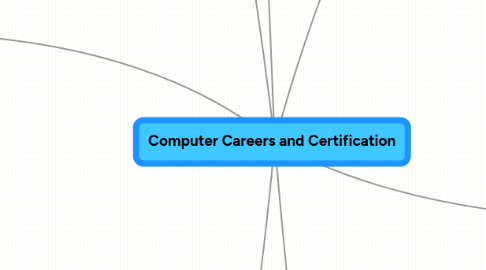
1. The Computer Industry
1.1. A demand for computer professionals continues to grow
2. Careers in the Computer Industry
2.1. Jobs in the IT department typically are divided into six main areas
2.1.1. Management
2.1.2. System development and programming
2.1.3. Technical services
2.1.4. Operations
2.1.5. Training
2.1.6. Security
2.2. Employees in the IT department work together as a team to meet the information requirements of the organization
2.3. Employees also are responsible for keeping all the computer operations and networks running
2.4. Job opportunities in the computer industry generally are available in one or more of these areas:
2.4.1. General business and government organizations and their IT departments
2.4.2. Computer equipment field
2.4.3. Computer software field
2.4.4. Computer service and repair field
2.4.5. Computer sales
2.4.6. Computer education and training field
2.4.7. IT consulting
2.5. The computer equipment field consists of manufacturers and distributors of computers and computer-related hardware
2.6. Careers in this field are available with companies that design, manufacture, and produce computers and devices
2.7. Corporate trainers teach employees how to use software, design and develop systems, write programs, and perform other computer-related activities
2.8. An IT consultant provides computer services to his or her clients
2.9. Job titles might include:
2.9.1. Project leader
2.9.2. Project manager
2.9.3. Desktop or mobile application programmer/developer
2.9.4. Technical lead
2.9.5. Software engineer
2.9.6. Computer scientist
2.10. The computer service and repair field
2.11. Requires a knowledge of electronics
2.12. Computer salespeople must possess a general understanding of computers and a specific knowledge of the products they are selling
3. A Guide to Certification
3.1. Application Software Certifications
3.2. Operating System Certifications
3.3. Digital Forensics Certifications
3.4. Programmer/Developer Certifications
3.5. Hardware Certifications
3.6. Internet Certifications
3.7. Database System Certifications
4. Summary
4.1. Strong demand for computer and IT professionals
4.2. Variety of available computer-related careers
4.3. Computer education at trade schools, computer-related majors at colleges and universities, job searches, career development planning, professional organizations, and professional growth
4.4. Certification preparation, examinations, and resources
4.5. Specific certifications
5. Objectives Overview
5.1. Describe career opportunities available in various segments of the computer industry
5.2. Discuss functions of jobs available in an IT department
5.3. Distinguish between trade schools and colleges
5.4. Differentiate among various computer-related majors for college students
5.5. Identify ways to stay current with changing technology after graduation
5.6. List the benefits of certification for employers, employees, and vendors
5.7. Identify ways to prepare for certification
5.8. List the general areas of IT certification
5.9. Name some specific IT certifications in various certification areas
6. Preparing for a Career in the Computer Industry
6.1. A trade school typically offers programs in:
6.1.1. Programming
6.1.2. Web design and development
6.1.3. Graphics design
6.1.4. Hardware maintenance
6.1.5. Networking
6.1.6. Personal computer support
6.1.7. Security
6.2. If you attend a two-year college, check for an articulation agreement with a four-year university
6.3. Three broad disciplines produce the greatest number of entry-level employees
6.3.1. Computer Information Systems
6.3.2. Computer Science
6.3.3. Computer Engineering
6.4. Many companies list their job openings, internship opportunities, and career opportunities on their Web sites
6.5. Job seekers can create a video resume
6.6. Computer professionals with common interests and a desire to extend their proficiency form computer-related professional organizations
6.7. Web sites discuss or share opinions, analysis, reviews, or news about technology
6.7.1. Slashdot
6.7.2. The Register
6.7.3. AnandTech
6.7.4. Tom’s Hardware Guide
6.8. It is important to keep up to date on industry trends and technologies and to develop new skills
6.9. A user group is a collection of people with common computer equipment or software interests
6.10. Can be an effective and rewarding way to learn about and continue career development
6.11. Conferences, conventions, and trade shows are a great way to stay aware of new products and services
6.12. Hundreds of computer industry publications are available
7. Certification
7.1. Selecting a certification requires careful thought and research
7.2. Certification training options are available to suit every learning style
7.3. Certifications are typically taken on a computer at a testing center
7.4. With computerized adaptive testing (CAT), the tests analyze a person’s responses while taking the test
7.5. Certification is the process of verifying the technical knowledge of an individual who has demonstrated competence in a particular area
7.6. Computer certifications are available in these areas:
7.6.1. Application software
7.6.2. Operating systems
7.6.3. Programming
7.6.4. Hardware
7.6.5. Networking
7.6.6. Digital forensics
7.6.7. Security
7.6.8. The Internet
7.6.9. Database systems
7.7. IT certifications can:
7.7.1. Enhance employees’ careers
7.7.2. Increase professional standing
7.7.3. Increase employee salaries
